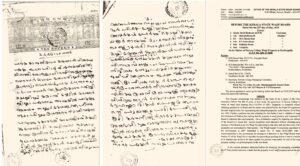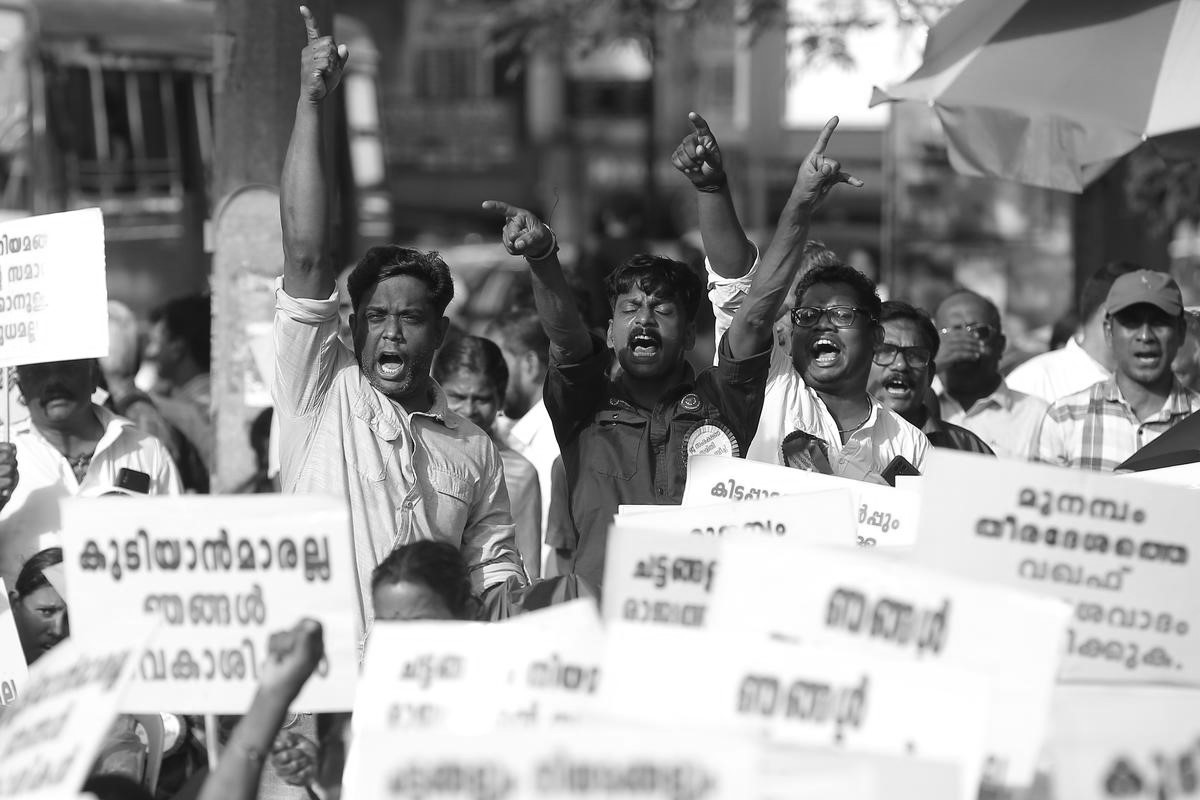This is the full text (unedited) version of the article appeared in The Wire, 11 November 2024. The Wire article is a shortened version.
The dispute over Waqf land in Munambam, Kerala, has become a minefield of growing tensions, especially as the state gears up for three crucial by-elections. The competing campaigns of Kerala’s major political fronts—LDF, UDF, and the NDA—have intensified efforts to mobilize public opinion, each seeking to capitalize on the issue for political gain. At its core, this conflict involves 404.76 acres of land originally endowed as Waqf property for Farook College in 1950. The legal wrangling over this property has thrown over 600 families into uncertainty, as they face the threat of eviction. The dispute not only stirs communal sentiments but also highlights the complex dimensions of historical property rights, Islamic legal principles, and modern legal frameworks.
Waqf in Islamic Law
The concept of ‘Waqf’ in Islamic jurisprudence refers to the irrevocable dedication of property for religious, charitable, or educational purposes.
The Shafi’i school holds that a waqf becomes irrevocable only once the property is delivered to a designated beneficiary or trustee. Until then, the endower (waqif) may retain the right to revoke it, unless there is an explicit declaration to the contrary. Sale or transfer of the property is strictly prohibited unless it becomes unusable.
In contrast, the Maliki school asserts that a waqf is binding from the moment it is declared, even without formal documentation. Unlike the Hanafi interpretation, the Malikis allow some flexibility, permitting changes or replacements to waqf property if it serves the original purpose better. However, the endower continues to hold a supervisory role.
The Hanbali school aligns with the Hanafi view in considering a waqf irrevocable once declared. However, it provides room for exceptions, allowing the sale or exchange of waqf property if it is essential to fulfill the waqf’s objectives, reflecting a pragmatic approach to changing circumstances.
Under the Hanafi school of thought, which the Kutchi Memon community in Kerala follows, once a property is declared as Waqf, it is considered to belong to God and cannot be sold, transferred, or inherited. The property must continue to serve the public good perpetually, managed by a trustee (mutawalli) who oversees its proper use according to Islamic principles. However, the Hanafi school does provide exceptions under specific conditions. For instance, if the original charitable intent of the Waqf cannot be fulfilled due to financial constraints or other practical challenges, modifications or even sales might be permissible. This flexibility, however, is tightly regulated to prevent misuse.
The question of whether the Munambam property, endowed to Farook College in 1950, fits within this framework has been a central point of legal contention, particularly since the deed contained a conditional clause that if the college ceased to operate, the land would revert to the original donor’s heirs.
Genesis of the Dispute
The origins of the Munambam Waqf property in Vypin Island (under Ernakulam district) can be traced back to the early 20th century. The Kutchi Memons, a trading community from Gujarat, migrated to Kerala and established a foothold in the Cochin-Travancore regions. It is said that Abdul Sattar Sait, a prominent member of the Memons, was granted a lease in 1902 for approximately 404.76 acres of land in Munambam by the Princely State that controlled the land. There are now contentions that the said land was actually purchased by Sait and it was not taken on lease for cultivation because the said property itself was most unsuitable for any cultivation due to frequent sea erosion and other issues. This land, it is stated, was formally registered in 1948 by his close relative, Mohammed Siddique Sait.
In 1950, Siddique Sait endowed the land to Farook College through a Waqf deed (Document No 21151950). The deed stipulated that the property was to be used exclusively for educational and charitable purposes with a transaction (krayavikraya) right. The transaction right was apparently given under the Hanafi law and it was intended only to serve the cause of waqf. However, the deed also contained a unique conditionality: if the college ceased its operations, the land would revert to Sait’s heirs. This clause introduced ambiguity regarding the absolute nature of the Waqf, complicating subsequent legal interpretations.
Evolution of Waqf Laws in India
To understand the legal framework surrounding this dispute, it is crucial to review the evolution of Waqf laws in India. The Waqf Act of 1954 was the first comprehensive attempt to regulate the management of Waqf properties across India. It established State Waqf Boards to oversee the administration of these properties and prevent misuse. Amendments to the Waqf Act in 1995 introduced stricter controls to prevent unauthorized sales or transfers of Waqf properties. Sections 51-56 of the Act explicitly prohibit the sale or alienation of Waqf land without the prior approval of the Waqf Board. The 2013 amendment further strengthened these provisions by imposing penalties for non-compliance and streamlining procedures for reclaiming encroached properties.
The Kerala Waqf Rules, specifically Rule 95, empower the Chief Executive Officer (CEO) of the Waqf Board to conduct inquiries into unauthorized sales and encroachments. If the CEO determines that a property was improperly sold, the Board can order its recovery. These legal provisions have been invoked in the ongoing Munambam dispute, where the Waqf Board is attempting to reclaim land allegedly sold without authorization by Farook College.
Role of Farook College

Farook College, one of Kerala’s leading educational institutions, was initially entrusted with the Waqf land to support its educational mission. However, over the decades, the college management engaged in transactions that have since been deemed unauthorized. K.M. Seethi Sahib, a prominent political leader and community figure, served as the Secretary of the Farook College Managing Committee during the 1950s. He played a major role in the college’s development and was also instrumental in acquiring funds and lands for the college. Seethi Sahib, who later became Speaker of Kerala Legislative Assembly, envisioned utilizing the property to establish a satellite campus for Farook College, aiming to expand educational opportunities in the region. K.A. Jaleel, who served as the Principal of Farook College from 1957 to 1979 and later as the Vice-Chancellor of Calicut University, was closely associated with Seethi Sahib. Before his demise in 1961, Seethi Sahib entrusted Jaleel with the responsibility of ensuring that the Munambam property was utilized effectively for the college’s benefit. This was acknowledged by Jaleel in his autobiography. However, during Jaleel’s tenure, the envisioned satellite campus did not materialize. There was also a serious lapse on the part of college to register the property with the Waqf Board in time.
In a controversial development, during Jaleel’s tenure as Chairman of the Kerala Waqf Board (1998-2003), the college’s managing committee granted a power of attorney to Advocate M.V. Paul in December 1998, authorizing the sale of portions of the Waqf property. This action violated Waqf regulations, which required prior approval from the Waqf Board for any transfer or sale of Waqf properties. The unauthorized transactions led to legal disputes and were later deemed void.
A complaint filed in 2008 by a former Waqf Board member brought these unauthorized transactions to light. An investigation led by Justice M.A. Nisar in 2009 confirmed that the sales violated the terms of the original Waqf deed. But, both the government and the Farook College failed to take any action on this.
The Waqf Enquiry Commission also recommended that the government issue a directive to the Waqf Board under Section 97 of the Waqf Act. This directive was aimed at speeding up the proceedings pending before the Board and assessing whether any action should be taken against individuals who had sold waqf property by falsely presenting it as gifted property in the sale deeds.
However, in its counterstatement to the Board, the managing committee of Farook College asserted that the property in question was not waqf property. They argued that, at the time of the waqf’s creation, a significant portion of the property was occupied by tenants and kudikidappukars (landless labourers). They also claimed that over 300 acres of the total 404.76 acres had been eroded by the Arabian Sea. For the remaining land, the managing committee had initiated legal action against its occupants through the case O.S. 53/1967, during which the court appointed an official receiver to collect income from the property for its maintenance.
During the inquiry, Farook College had initially made certain claims before the Waqf Board. However, they took a different stance by filing Writ Petitions No. 8900/2008 and 4447/2009 in the Hon’ble High Court of Kerala. These petitions claimed that the properties covered under Document No. 2115/1950 were owned by the college and sought a directive to the Assistant Director of Survey, Thrikkakara, for a re-survey of the properties.
In Writ Petition No. 8900/2008, it was asserted that the mutation of the property had been carried out in favour of the Farook College managing committee, and they had been paying the basic tax for 290.76 acres, as evidenced by a tax receipt dated 11-02-1998. This led the Waqf Board to conclude that the earlier claim by Farook College, stating that more than 300 acres had been submerged by the Arabian Sea, was incorrect. Furthermore, in the case O.S. No. 53/1967, a court-appointed receiver was designated to manage 114 acres of the land originally endowed by the waqif. The judgment in this suit referred to the title deed as a waqf deed, not a gift deed. It affirmed that the waqf intervivos (endowment during one’s lifetime) was validly completed by the owner’s mere declaration of the endowment.
The findings of the Committee, however, prompted the Kerala State Waqf Board to issue an order, after a decade in 2019 formally registering the land as Waqf property and declaring the previous sales void. It was at this stage that complaints emerged that the Nisar Committee also failed to take note of the tenants’ issue and their legal documents.
Legal Challenges Over the Years
In the 1960s, disputes over the control of the land began to surface, with tenants challenging Farook College’s authority. In 1967, a case (O.S. No. 53/1967) was filed in the Subordinate Judge’s Court in Paravur, questioning the Waqf status of the land. The court ruled in favour of Farook College in 1971, confirming that the property was indeed Waqf land dedicated to educational purposes. This ruling was upheld by the Kerala High Court in 1975, thereby reinforcing the Waqf status of the land.
Despite these rulings, Farook College’s management continued to engage in land transactions under the pretext that the land was only a ‘gift deed.’ The Kerala High Court took notice of these activities when petitions were filed challenging the legality of the sales. In response to the Waqf Board’s 2019 registration of the land, residents who had purchased plots from the college filed petitions claiming that the Waqf Board’s actions infringed on their property rights. They argued that the original Waqf deed did not explicitly transfer ownership to the Waqf Board but rather vested rights with the managing committee of the college.
In 2022, a Single Bench of the Kerala High Court briefly allowed residents to resume paying property taxes, which was seen as a move towards validating their claims to the land. However, this ruling was swiftly stayed following an appeal by the Kerala Waqf Protection Forum, which argued that continued tax payments would complicate the Waqf Board’s efforts to reclaim the property.
Amid growing agitation, the High Court of Kerala recently directed the state and Union governments to file a counter affidavit in response to a petition filed by the residents of Munambam challenging certain provisions of the Waqf Act. The petition was filed by Joseph Benny and seven others from Munambam who had purchased land from the managing committee of Farook College, Kozhikode. They alleged that the Waqf Board was taking steps to evict them and 600 other families saying the land belonged to it. The revenue officials had refused to mutate land documents at the request of the chief executive officers of the Waqf Board.
Stance of Ruling and Opposition Parties
Further adding to the precariousness of the situation, in December 2022, the LDF Minister in charge of Waqf, V. Abdurahman responded to a submission by Indian Union Muslim League (IUML) leader K.P.A. Majeed, affirming the government’s stance to reclaim what he asserted as Waqf land. Yet, interestingly, both LDF and IUML leaders have since changed their positions, publicly expressing support for the affected families and questioning the land’s Waqf status—a rhetorical somersault likely influenced by the looming bye-elections.
Even as land dispute has become a significant political issue, the BJP began capitalizing the situation to challenge both the CPI(M)-led LDF government and the Congress-led UDF opposition. The BJP has framed itself as a defender of property rights, appealing to the Christian and fishing communities who are at risk of eviction. This strategy aligns with the party’s broader agenda to question the constitutionality of Waqf laws.
The BJP’s campaign has gained traction, particularly after the Catholic Church voiced concerns over Waqf encroachments on community properties. The Sangh Parivar has argued that the pending Waqf (Amendment) Bill, 2024, would protect residents’ property rights. However, the proposed bill primarily aims to streamline the management of Waqf properties and curb administrative mismanagement, not to resolve historical disputes. The Sangh Parivar’s claim that the Waqf Amendment Bill of 2024 will address the Munambam dispute is misguided.
The dispute is rooted in the specific terms of the 1950 deed, which included a clause allowing the property to revert to the original donor’s heirs if the college ceased operations. This condition challenges the absolute nature of the Waqf under Islamic law, making it difficult to address through generic legislative amendments.
Toward a Balanced Resolution?
Plausibly, all parties now agree that the rights of the longstanding residents of the Munambam coast must be respected, as their deep-rooted connection to the land cannot be dismissed. These families, having lived there for decades, should not face eviction. However, amid this complex dispute, it must be noted, widespread encroachments have taken place, with numerous tourist resorts capitalizing on the area’s growing appeal. Many of these resorts and other vested interests are exploiting the ongoing agitation, using the plight of residents to shield their own unauthorized land occupations.
In response, the Kerala government has convened meetings with the relevant ministries, officials, and the Waqf Board to address this issue comprehensively. It seems imperative that these discussions urgently assess the legal standing of the residents, particularly those who hold legitimate title deeds. Ensuring their rights is crucial. At the same time, any illegally occupied portions must be identified and reclaimed, allowing the remaining Waqf land to be restored and safeguarded in accordance with existing laws. The resolution of this matter will also depend on the forthcoming decisions of the Kerala High Court, which is currently reviewing multiple petitions from different stakeholders.
A timely settlement is vital to restoring communal harmony and fostering mutual coexistence in Kerala. For the affected families, the stakes are not just legal but deeply personal—rooted in their right to continue living in their ancestral homes. To resolve this dispute, more than legislative interventions are needed. A constructive dialogue between the Kerala government, the Waqf Board, and the affected communities is essential to reach a fair and lasting solution. A pragmatic approach would be to recognize the rights of those with valid title deeds while also ensuring that the original charitable objectives of the Waqf are honoured.





👍🏻👍🏻